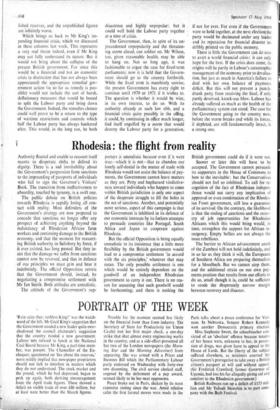I Rhodesia : the flight from reality Authority flouted and
unable to reassert itself resorts to desperate shifts to defend its dignity. There is a sad inevitability about the Government's progression from sanctions to the impounding of passports of individuals who fail to sign the Governor's Visitors' Book. The transition from ineffectiveness to absurdity, touched by tyranny, is a swift one.
The public debate on British policies towards Rhodesia is rapidly losing all con- tact with reality. Most defenders of the Government's strategy are now prepared to concede that sanctions no longer offer any prospect of achieving anything beyond the redundancy of Rhodesian African farm Workers and continuing damage to the British economy, and that the moment for reassert- ing British authority. in Salisbury by force, if it ever existed, has long passed. But they in- sist that the damage we suffer from sanctions cannot now be reversed, and that in defence of our principles we must grin and bear it indefinitely. The official Opposition retorts that the Government should, instead, be negotiating a compromise settlement with Mr Ian Smith. Both attitudes are unrealistic.
The attitude of the Government's sup- porters is unrealistic because even if it were true—which it is not—that to abandon our lonely self-denial in the matter of trade with Rhodesia would not assist the balance of pay- ments, the Government cannot leave matters as they are. Petty and haphazard vindictive- ness toward individuals who happen to come within British jurisdiction is only one aspect of the desperate struggle to fill the holes in the net of sanctions. Another, and potentially more serious, aspect of this campaign is that the Government is inhibited in its defence of our economic interests by its forlorn attempts to persuade countries like Portugal, South Africa and Japan to cooperate against Rhodesia.
But the official Opposition is being equally unrealistic in its insistence that a little more flexibility by the British goiernment would lead to a compromise settlement 'in accord with the six principles,' whatever that may mean. The only possible settlement is one which would be entirely dependent on the goodwill of an independent Rhodesian government to carry it out. There is no rea- son for assuming that such goodwill would be forthcoming; and there is nothing the 13 itish government could do if it were not.
Sooner or later this will have to be accepted. The Government cannot persuade its supporters in the House of Commons to bow to the inevitable: but the Conservatives should not feel so inhibited. To call for re- cognition of the fact of Rhodesian indepen- dence would not carry any implication of approval or even condonation of the Rhodes- ian Front government, still less a guarantee of its survival. On the contrary, the likelihood is that the ending of sanctions and the recov- ery of job opportunities for Rhodesian Africans which this would bring would, in time, strengthen the support for African in- surgency. Empty bellies are not always the most rebellious.
The barrier to African advancement south of the Zambesi will not hold indefinitely, and in so far as they think it will, the Europeans of Southern Africa are preparing themselves for a bloodbath. But we cannot stop them. and the additional strain on our own pay- ments position that results from our efforts to do so, small though it is, could be sufficient to erode the desperately narrow margin between recovery and disaster.






































 Previous page
Previous page